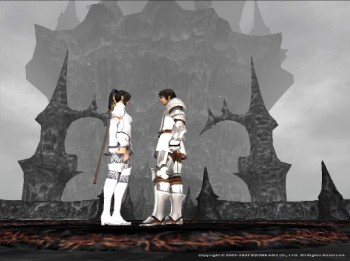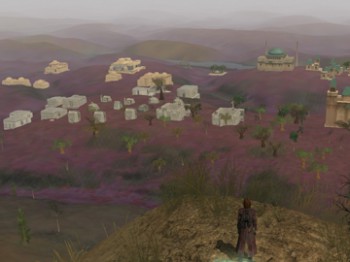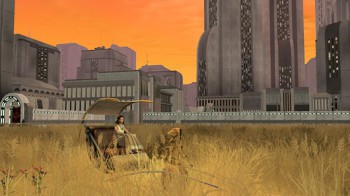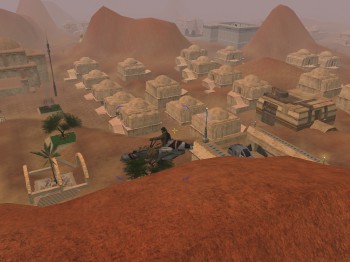Art of the Genre: Art of the Disappearing MMORPG

You can never go home again, or at least I believe that’s the saying. I tend to agree, as my home town in NowhereVille Indiana stands as a shining example of the power that ‘getting out’ has on a person’s life. Still, when I do make it ‘home’ — and yes, although I’ve lived in four other states and half a dozen apartments, condos, and houses longer than the days where I spent my youth, my mother’s house on the Tippecanoe is still my home — I can breathe easy like nowhere else in the world. [On a sad note, someone recently related to me that maturity is achieved the day you lose your last parent because you are truly on your own. I’ve luckily not reached that level of independence, and certainly that is why my mother’s house still holds such warmth, because there I’m still the child, and who doesn’t like being the child once in a while?]
Honestly, I could shed tears as I write such profound revelations, as I think about home, three thousand miles from the City of Angels and all the chaos that goes with it, but I won’t. Instead, I want to try to translate that same feeling to another venue, that being the art of the quickly disappearing MMORPG.
Before I can truly begin to talk about the vanishing, however, I suppose I should first discuss life. On the 16th of March, 1999, Sony’s 989 Studios released Everquest and the world of online gaming was never the same. Sure, Ultima Online had been around since 1997, but it never stole gamers’ attention and basked in the world spotlight like Everquest, or ‘Evercrack’ as it was called by many because of its addictive qualities.
This game, eventually wrapped into the Sony Online Entertainment bundle, had hundreds of thousands of registered players by 2004. Somewhat unbelievably, thirteen years later, another expansion for the game appeared this November [2012], but like most games of its kind, the death throes can be a long and lonely road.

My personal MMORPG journey also takes me there and back again, but not with Everquest. Instead, my drug of choice was the LucasArts and SOE blockbuster Star Wars Galaxies. Upon its release on June 26th, 2003, the game was said to have more than 400,000 pre-registered fans, and by 2006 had sold 1,000,000 units worldwide. [Note: at one point Blizzard Entertainment claimed 14 million worldwide users of World of Warcraft, a feat that still blows my mind today.]
I was there in this new Star Wars universe that first day, amid the bugs, the crashes, the patches, and the various strange happenings as thousands of people just like me travelled for the very first time to a galaxy far, far, away as a 3D fully interactive avatar. I well remember slipping out of my marital bed at 2:30 AM to go to my study and play unchecked until server maintenance at 7:30 EST. Once my wife left the house for work at 9:30, it was a dead scramble back to the game until she returned home any time between 6 and 10 PM.
For all of you scoring at home, that is somewhere around 11 hours a day of gaming during the work week, as I didn’t play on weekends. So 55 hours of productive time a week was plugged directly into my computer. Lucky for me, by April 2005 I was done, and walked away… just walked away, but still, that was nearly two years of life invested in pixels.
This is a perfect example of what little self-regulation, ample free time [ah the life of a writer!], depression, and an MMORPG can do to a person. They are devourers of life, and for those years that the game possessed me I shudder to think about how many hours I put into creating a world for myself that somehow seemed more important and so much brighter than the one I lived in.
That world, that ‘home’ if you will, was as real as any you could imagine, and so it is for so many who play these games, whether Asheron’s Call, Vanguard the Saga of Heroes, World of Warcraft, City of Heroes, Dark Age of Camelot, or any other. To the players, those that invest countless hours building a character their strange new world can be proud of, these games are something far more valuable than digital ones and zeros on a distant server in Arizona.

The act of creation, both by the artists who design the games and the players that utilize draft material to make the mundane magic, becomes a thing of beauty that has to be recognized for the untold investment it requires.
I mean, think about it. If you took everything you were, every spare moment of waking time, imagination, energy, and brain power and focused it on one thing and one thing only for two years, how incredible would that thing be? I often consider my guitar skills, or lack thereof, if I’d utilized my time differently. In February 2003 my wife got me guitar lessons. By November, I’d stopped going to them because I couldn’t sacrifice the hour on a Tuesday to go to the lesson because the game was too important. Now if I’d put every moment of time I vested in SWG into my Yamaha acoustic, what kind of player would I have become? I’m telling you, people at parties would much prefer me channeling my inner Eric Clapton than discussing my max-level Rori-born weaponsmith/pistoleer.
Still you have to wonder if, in some way, what I did in the game somehow relevant in real life? Does it truly matter in the long run? Who can ever truly say, but it is a fact that in December 2011 Star Wars Galaxies shut down for good, so anything I created there is no more. Whatever home I had is gone and there is no more visiting for me. In this case, I simply can’t go home again.
There was a moment, however, in 2008, when I decided it was time to return to the familiar climes of the SWG universe. I downloaded another copy of the game, got a free thirty day trial, and went back to the place I’d called home in those heady days of 2003. Granted, when I left SWG in 2005, it was already faltering, already losing players I’d called friends, and had ‘ghost towns’ that were once populated with a universe of dramatic individuals, but I wasn’t really prepared for what was left three years later.
It was a series of worlds devoid of ‘life’. Instead of being Star Wars, the game had turned into a kind of post-apocalyptic journey, a place where you wander endless ruins without a soul in sight. The feeling of loss was dramatic, and as I moved across incredibly rendered alien landscapes, I would discover homes in the wild that begged the questions ‘Who lived here? What were their dreams? Where are they now?’

This was a mission that became an exercise in archaeology, or even social anthropology. Homes that took countless hours to build, decorate, and place stood like bastions of a wasted future. In some cases these were works of art, and the cost to build them was incredible, yet here they stood abandoned and without anyone left to appreciate the toil that went into their creation.
The same can be said for the worlds themselves, each a shining example to the visions of George Lucas. Endless hours of programmers’ days and concept artists’ nights were consumed to create this vision, and yet one day it would come to an end. All the investment would be sucked away in an electric vacuum when the server was disconnected.
MMOs are and always have been a different breed of game because they are the most organic of all systems. First person shooters come and go, but you don’t build in them, you simply destroy. Halo, Call of Duty, Medal of Honor: they are recyclers of combat and scenario. Madden, NBA Live, and any sport clash are talent machines of button crunching, but once the contest ends, another is born exactly like the first. Solo play RPGs don’t devolve and don’t grow, they simply reset on the save, and Wizardry or Bard’s Tale today is the same as it was in 1984 if I reboot it on my system.
No, only the MMO creates, and in that act of creation, art is born. That is the addiction, the community sense, and yet it seemingly can’t last forever.
But for those who have played these games, and fewer and fewer are being made or maintained today, I salute you for your creativity and the arts you employed to make the world more vibrant than it was when you entered.
So it goes with MMOs, a life cycle fulfilling its purpose over the course of a few years as the collective consciousness of gamers migrate to new platforms. Still, if any of you have ever wondered if what you did was appreciated, I tell you it was, because there have to be others like me who walked the deserted worlds and still marveled at your creations.
Perhaps MMOs are not long for this world, or like most life cycles, there will be a rebirth at some point. But whatever the case, take heart that art was fulfilled, if even just in the screen of your, or my, computer.
> Instead of being Star Wars, the game had turned into a kind of post-apocalyptic journey, a place
> where you wander endless ruins without a soul in sight… This was a mission that became an exercise in archeology,
> or even social anthropology.
Scott,
Wow. A powerful testament to a vanished era.
Like you, I was captivated — to probably an unhealthy degree — by role playing as a teenager, and I stayed away from MMOs as a result. I knew what they would do. I watched my friends devote countless hours to MERIDIAN 59, then EverQuest, then World of Warcraft.
These days I watch my son play CITY OF HEROES… and witnessed just how devasted he was when NCsoft announced they were shutting the game down on November 30 of this year.
Are MMOs dying, do you think? Or is the industry just consolidating around a few bigger titles?
I don’t know that MMOs are dying, but the entire video game industry is a mess, and companies are folding like an associate at the Gap.
Certainly some have legs. WoW never seems to die [although I’d like to see their subscription numbers] LotR Online went free play and their revenue and numbers went way up. Final Fantasy XI is a decade old this year and is swarming with people [although the did have a server convergence a couple years back], and Everquest lives on, or for space opera you’ve got EVE.
Still, for these few successes, there are six large games that have gone under. I’d just say it’s an evolution, a process, and I doubt there will ever be a time when there are no MMOs out there, but your choices will surely decrease as this decade wears on.
I mean in 2011 you had two huge MMOs launch, Skyrim and Star Wars: Knights of the Old Republic. Both made an initial splash, but I’ve heard very little from either after a year on the market. The year before you had Rift, which by GenCon 2011 they gave a free copy of the game to every attendee and the trash was filled with them.
I know City of Heroes hit a lot of people very hard as it filled a niche the people enjoyed, but companies just can’t sustain games that aren’t big returners, thus flagging or static subscriptions are the doom of these games.
World of Warcraft is still going pretty strong, but I think it’s a phenomenon that is not to be repeated.
According to a recent investor call they’re still over 10 million subscribers worldwide.
http://wow.joystiq.com/2012/11/07/world-of-warcraft-subscriber-numbers-remain-over-10-million/
Laurie: 10 million is still a daunting number, but if you take into account they were at 14, that is nearly a 30% drop in subscribers of the past two years, not a great sign for the franchise. Still, WoW is the undisputed ‘king’ and nothing has ever come close to touching it.
Skyrim MMO in 2011? Skyrim wasn’t MMO. Elder Scrolls MMO hasn’t launched yet. Were you thinking of a different game?
I played Temple of Apshai many years ago (kids today can’t comprehend what RPGs looked like in the beginning), but only just entered the MMO world a month ago with Age of Conan.
BEAUTIFUL game (much better looking than LOTRO). Not many players around (I can play a couple hours without seeing anyone) and Inflexible customer support from Funcom. Dying game, though it’s an excellent product.
Someday scholars will boot those old servers back up, a generation of starving grad students will write dissertations on the lost worlds of the MMORPGs, and holographic renderings of the coolest settings will be displayed in museums, real or virtual. I hope I’m still around to see them then, because I don’t play computer games–haven’t since Wizardry on my Apple II. I inherited a predisposition to addition, so it’s been one of the great projects of my life to limit my addiction repertoire to books and caffeine. The folks I know who got sucked into MMORPGs did miss out on the waking world, but I have to admit, I envied them sometimes the wonders they got to see.
Sherlock: Was Skyrim a solo FPS? I never played it, but it looked very MMO in the adds, go figure *shrug*
Sarah: The Addictive gene is a bad one, stay away from MMOs! 🙂 And yes, as a social experiment, it is a crazy thing!
Skyrim is a first-person RPG. The vastness of the Elder Scrolls games has led some to jokingly call them “single-player MMOs”, but they’re really just evolutions from the likes of Ultima Underworld and Dungeon Master.
I’ve never been able to get into MMORPGs because I like video GAMES and MMOs feel more like virtual theme parks to me – come in, see the sights, hang out with some friends, take part in some activities, then “go home”. I don’t feel challenged by them, although I can see how they would appeal to folks in a different way.
I left Star Wars: Galaxies about four months after the Jump to Lightspeed expansion. I stopped when I realized all I was doing was logging in, checking on my thriving architecture business, and logging out. At that point it was a second job. Still it was a big, beautiful, sandbox, and I miss it.
While I’ve known many MMORPG addicts, I’ve never been one. A little ADD comes in handy with games like this. After a few hours, I get bored.
Of course I’ve had friends become jerks when I am disinclined to spend six hours a night, four nights a week to get a server first kill. They honestly wonder why I even bother to play the game. To me, that is the legacy of WoW. I never encountered that in MMOs before WoW.
A few friends and I left WoW for LotRO and Dungeons and Dragons Online a few years ago. We play casually for a few hours once a week. We talk, we kill Goblins. We have fun.
Yes, I’ll probably pick up the Elder Scrolls MMO when it comes out. Unlike SWtOR, it looks like they kept the best parts of the single player game, while incorporating the community of an MMO. Looks fun.
[…] Art of the Genre: Art of the Disappearing MMORPG […]
[…] always seems to bring me back to my post here on November 15th, 2012. In it I spoke about the Art of Disappearing MMORPGs, and for some reason I feel the need to speak on the subject a bit more and I apologize if I […]